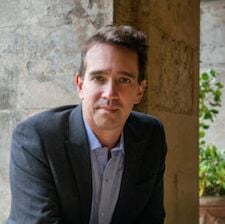The Silk Roads is a term coined in the 19th century to describe the web of connections that tie different regions, cultures and peoples of Asia together, and ultimately link them with Europe, Africa and – after the 16th century – with the Americas.
The work of this Chair
Almost ten years ago, Professor Frankopan published a book called ‘The Silk Roads: A New History of the World’.
The book describes how peoples, goods, ideas, religions and more, have been connected from antiquity to the world of today. It looks at interactions between different regions as well as at long-distance exchange; it looks at how oral histories and nomadic and mobile groups have often been excluded from traditional histories – meaning that their significance has often been ignored or overlooked entirely. In the book, Professor Frankopan argued that while the focus of most scholars has been firmly fixed on Europe and the west, not only are other histories important – but that they themselves help us better understand the past as a whole.
We are living in an age of profound and multiple changes. One of the most significant, however, is the shift in centres of political and economic power. Professor Frankopan wrote about these too in a book titled ‘The New Silk Roads: The Present and Future of the World’, that looked at how China, India, states in the Gulf, Central Asia and beyond are playing increasingly vital roles in regional and global affairs, bot individually and collectively. As Professor Frankopan noted, “the Silk Roads are rising again.”
This is something that is keenly felt from China to Iran, from the Middle East to South Asia: the idea that the world’s centre of gravity is shifting back to where it lay for centuries, for millennia even, does not just fall on fertile ground, but resonates with historians, teachers, politicians, business people, those in the NGO sector and beyond.
The appetite to learn about the past through new lenses, to look at past periods of co-operation, collaboration and rivalries is almost tangible.
The Silk Roads programme at King’s College, Cambridge was set up in 2020 both to champion inter-disciplinary research into all aspects of Silk Roads studies at Cambridge, but also to serve as an opportunity to gather scholars and ideas from all around the world.
The programme’s seminar series, workshops and conferences have already paid dividends in prompting new work on the history of rivers in Central Asia, on the dissemination of medical knowledge across Southeast Asia, and in looking at the effects of Soviet rule in Kazakhstan in the 1920s and 1930s.
Professor Frankopan has worked with UNESCO for many years as co-Chair of the Silk Roads Youth Research Grant and can testify to the extraordinarily diverse and exciting work being done by scholars around the world in all areas of Silk Roads studies.
The UNESCO chair will allow King’s College, Cambridge, its research fellows in Silk Roads studies and the community of specialist scholars and members of the general public that has built up to further promote the study of the human and natural histories, the cultures, geographies of the Silk Roads – and above all, to help show their role in local, regional and global histories.
About the Chair Lead

Peter Frankopan is Professor of Silk Roads Studies and a Bye-Fellow at King’s College, Cambridge and is a member of the Advisory Board of the Sevgi Gönül Center for Byzantine Studies at Koç University, Istanbul.
Professor Frankopan works on the history and politics of the Mediterranean, Russia, the Middle East, Persia/Iran, Central Asia, China and beyond – as well as on the histories of climate, natural resources and connectivities. His books ‘The Silk Roads: A New History of the World’, ‘The New Silk Roads: The Future and Present of the World’ and ‘The Earth Transformed’ have been translated into forty languages.
A Fellow of the Royal Historical Society, the Royal Society of Literature, the Royal Asiatic Society, the Royal Geographical Society, the Royal Society of Arts and the Royal Anthropological Institute, Professor Frankopan is President of the Royal Society of Asian Affairs. He is co-Chair of the Scientific Committee of the Silk Roads Youth Research Grant at UNESCO as well as the wider Silk Roads programme. He is part a Leverhulme prize team working on the rivers of Central Asia, looking at climatic changes in antiquity, late antiquity and around the time of the Mongol conquests.
Since 2016, Professor Frankopan has been involved with the ‘Bridge for Cities’ Programme of UNIDO (United Nations Industrial Development Organisation). In 2017, Professor Frankopan was appointed Senior Advisor and Academic Expert to a major project for the World Bank and Department for International Development (DfID) on Transport Corridors in South Asia.
Professor Frankopan also works closely with UNESCO, UNDP, the Asian Development Bank, as well as multi-lateral institutions and governments on issues ranging from geopolitics, security, energy and transport infrastructure and climate change.






